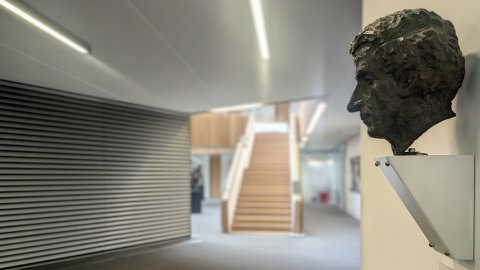Course Overview
The course gives an introduction to a topic of current interest in Lorentzian geometic analysis and mathematical General Relativity: an approach to nonregular spacetimes based on a “metric” point of view.
Learning Outcomes
Becoming acquainted with Lorentzian length spaces, sectional and Ricci curvature bounds for non-regular Lorentzian spaces and the appropriate techniques.
Course Synopsis
Lecture 1a: Review of Lorentzian geometry, spaces of constant curvature, causality theory, singularity theorems.
Lecture 1b: Introduction to Lorentzian length spaces, timelike sectional curvature bounds.
Lecture 2a: Optimal transport, timelike Ricci curvature bounds
Lecture 2b: Sobolev calculus for time functions. Literature: [O’N83, KS18, CM20].
Reading group: Depending on student’s interest one could discuss the papers [GKS19, AGKS21, ABS22].
References
[ABS22] L. Aké Hau, S. Burgos, and D. A. Solis. Causal completions as Lorentzian pre-length spaces. General Relativity and Gravitation, 54(9), 2022. doi:10.1007/s10714-022-02980-x.
[AGKS21] S. B. Alexander, M. Graf, M. Kunzinger, and C. Sämann. Generalized cones as Lorentzian length spaces: Causality, curvature, and singularity theorems. Comm. Anal. Geom., to appear, 2021. doi:10.48550/arXiv.1909.09575. arXiv:1909.09575 [math.MG].
[CM20] F. Cavalletti and A. Mondino. Optimal transport in Lorentzian synthetic spaces, synthetic timelike Ricci curvature lower bounds and applications. Cambridge Journal of Mathematics, to appear, arXiv:2004.08934 [math.MG], 2020. doi:10.48550/arXiv.2004.08934.
[GKS19] J. D. E. Grant, M. Kunzinger, and C. Sämann. Inextendibility of spacetimes and Lorentzian length spaces. Ann. Global Anal. Geom., 55(1):133–147, 2019. doi:10.1007/s10455-018-9637-x.
[KS18] M. Kunzinger and C. Sämann. Lorentzian length spaces. Ann. Glob. Anal. Geom., 54(3):399–447, 2018. doi:10.1007/s10455-018-9633-1.
[O’N83] B. O’Neill. Semi-Riemannian geometry with applications to relativity, volume 103 of Pure and Applied Mathematics. Academic Press, Inc. [Harcourt Brace Jovanovich, Publishers], New York, 1983.
Should you be interested in taking part in the course, please send an email to @email by 10 May 2024.


